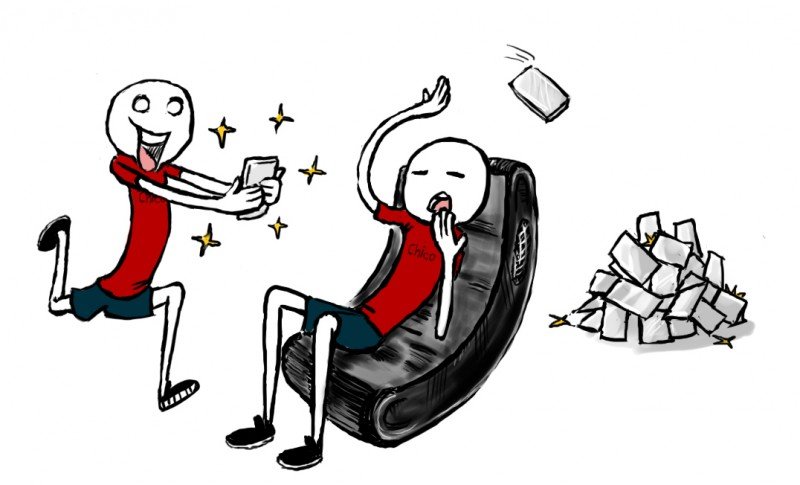Advancements in technology have it made easier for us to access Multimedia. Large quantities of music, movies and games are available to us with the push of a button. But can too much of a good thing actually be a bad thing?



Music
Before music was available on digital formats there were vinyl records and cassette tapes. There was piracy (primarily cassette tapes) but nothing like on the scale it is now.
The introduction of the CD offered better quality music and digital excellence. After the digital revolution of the CD, a new phenomenon appeared . A compression method for data called MP3 (The history of MP3 detailed).
MP3 made it possible to compress audio into small files which in turn made it easy to distribute over the internet. With the arrival of new Peer-to-Peer programs like Napster, Piracy of music files boomed. Suddenly all you had to do to get the latest album of your favorite artist was to download the MP3 file.
Record Companies fought long and hard trying to bring down Peer-to-Peer sites and even tried to dissuade people from using MP3's. The fact that there was quality loss with the MP3 files did not seem to matter to the public. The popularity of the MP3 skyrocketed. Companies Microsoft and Sony introduced their own music files like WMA and ATRAC but these never became very popular.
It took a long time but in the end, it seemed that the only way to effectively battle the Piracy was to offer services like Spotify and Deezer. These online Services offer consumers access to large databases of music files at a relatively low price.
The consumers went from a situation where possessing music was regulated and limited to a situation where large libraries of music were accessible almost for free and at high quality.


Movies en TV shows
Watching TV shows and Movies before the digital era was done either through cable TV and/or in a Movie theater. When broadband internet connections became more commonplace in households, more and more people were able to share large files over the internet. DivX and Xvid became the MP3 equivalent for video files. Now it was possible to download TV shows and even the latest movies from the internet using Torrents, Newsgroups and other Peer-to-Peer solutions.
Just like the with the music companies, it took the movie industry a long time to effectively counter the Piracy. The battle against Piracy is in fact still ongoing but Streaming services like Netflix and Amazon seem be to turning the tide and showcasing themselves as a good alternative to the illegal downloading of video files.


Games
Buying console games used to be a straightforward thing during the 8-bit and 16-bit era of gaming consoles . You bought a game cartridge and played it until you finished the game. If you really liked the game you played it again until you were able to save up and buy another game. Things changed when CD based consoles were launched.
Very soon after the first CD based consoles were launched it became possible to play copied games. Of course with PC gaming Piracy had been a thing long before the phenomenon came to the gaming consoles.
Steam made PC games even more affordable than they were before. With the online service you can build a game library with games that is so large that you would not be able to play through it, even if you tried.
Whether it is by legal or illegal means, consumers are able to acquire more games than they could ever hope to play.

The Relation between Value, Possession and Availability
The point I am trying to make is not whether the Music, Videos or Games are acquired by legal or illegal means. The fact that it is available and can be acquired is what I am trying to stress. Consumers have access to large amounts of digital content, more than they ever had in the past.
But does the Consumer attribute the same value to the easily and abundant digital content as to the harder to acquire (analogue) content?
When I owned a Sega megadrive I kept playing my games even after I had finished them. The cartridges were expensive and I wanted to get the most out of my purchases. I even replayed the mediocre games more times than I can remember. But that changed when I was able to get my hands on copied games for the Playstation, Dreamcast and the Xbox 360. Now I had way too many games, I often just played a game for a few minutes and then moved on to the next new thing.
With PC gaming things aren't much different. I have an extensive library with games I have barely or never played.
The thing is that a lot of these games are actually very good but the overwhelming amount of high quality games and the low price point don't compel me to get the most out of my purchases like with the Megadrive.
It is my opinion that consumers will attribute a lesser value to products that are too easily acquired and available in extremely large quantities especially if there are certified means to keep acquiring these products against no or very low costs.
So Yes, Too Much Of A Good Thing Can Actually Be A Bad Thing

@xervantes/why-you-should-be-excited-for-destiny
@xervantes/why-the-dreamcast-was-ahead-of-its-time



